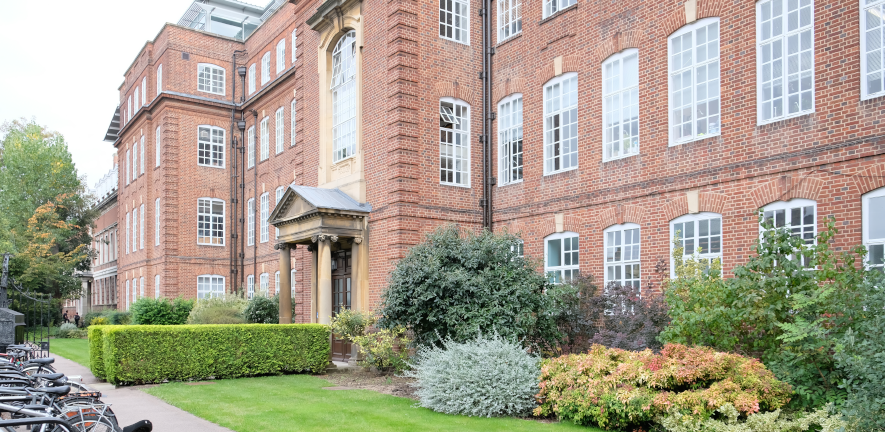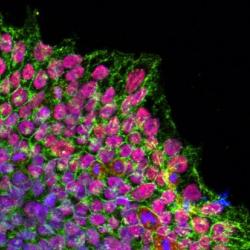
The Department of Pathology is a bridge between fundamental research and medicine.
Pathology, or the study of the causes and effects of disease, is essential for advancing medicine and devising new treatments.
Founded in 1883, the Department of Pathology is one of the largest departments within the School of Biological Sciences, dedicated to delivering excellence in scientific research and teaching.
Our research seeks to understand—and so ultimately arrest and reverse—disease processes of medical and social significance, and we operate with an annual research income of approximately £10 million. We have a major commitment to the teaching and training of over 800 undergraduate students of medical, veterinary, and natural sciences. Researchers in the Department have a history of making major findings, like the discovery of apoptosis, or in the discovery and development of medicines, like Campath (also known as Alemtuzumab), a treatment for blood cancers, rheumatoid arthritis, and multiple sclerosis.
We support over 35 research groups located on the Downing site and at Addenbrooke’s hospital. Our research portfolio spans immunology and infectious diseases, including virology, microbiology, parasitology and genetic diseases, including cancer. A major priority for our researchers is the translation of our findings for patient benefit, including developing diagnostics, new therapeutics and vaccine development and running clinical trials. In REF2021, the Department of Pathology was returned as part of the top-ranked Unit of Assessment 1, where 70% of research labs were classed as world-leading and 25% as internationally excellent.
Our community of scientists includes approximately 110 graduate students undertaking MPhil or PhD research and over 50 postdoctoral research staff. We also support talented senior researchers who wish to launch independent research groups and currently have seven early career Research Fellows. We aim to support all our scientists at all stages in their career development and to help our established academic staff remain active in research.
The Department delivers excellence in teaching our Part IB Biology of Disease course to over 450 students taking the Medical and Veterinary Sciences Tripos and the Natural Sciences Tripos. We have about 90 students doing Part II Pathology either as a Single Subject or as part of the BBS with option choices in infectious diseases (microbiology, parasitology, virology), genomics and genetic diseases (cancer), immunology, and the dynamics of infectious disease. We also contribute to teaching IA and IB mathematical biology courses. Feedback from our undergraduate students reflects our excellence in teaching and the dedication of our teaching and administrative staff.
We strive towards a positive and inclusive research culture and have a zero-tolerance policy toward bullying, harassment or discrimination. We embed equality and diversity objectives in the working practice of all committees and the governance structure of the Department. Any member of staff or students concerned about any aspects of the research culture in the Department should talk to the Head of the Department, the Departmental Administrator or any of our Wellbeing Ambassadors.
Head of Department
“It is a privilege to be elected by my peers to serve as the tenth Head of the Department of Pathology, and especially to be the first woman to take on this role. As a Department, we are united in our pursuit of discovering and translating new knowledge, in the training and education of the next generation of scientists and in engaging with the public about our discoveries and advances in treatments. I am convinced our research and training excellence will make vital contributions to safeguard and improve society now and for future generations.”
Professor Heike Laman
Professor of Cellular and Molecular Biology
Email: hod @ path.cam.ac.uk
Phone: 01223 333722
Find out more
History of the Department
Pathology has been studied at the University of Cambridge for almost 140 years.
In 1883 Charles Roy was appointed the first Chair of Pathology and led this new academic field. He was succeeded in 1897 by the scholarly Alfredo Kanthack, who had been his Deputy. Kanthack was young (just 34 when he took the Chair) but already carried an international reputation and had eclectic interests - phagocytosis, snakebite venoms, tetanus, thyroglossal cysts, and football. The use of formalin as a histological fixative is credited to him.
He was succeeded by German Sims Woodhead—who housed the department in the new Medical School (now a part of the Zoology buildings) and created a new course and examination in Pharmacology and Pathology that had become an essential part of undergraduate medical education, colloquially referred to as "Bugs and Drugs".
Henry Roy Dean, who - in his phenomenally long reign from 1922 to 1961 - moved the Department to our current building on Tennis Court Road and at the rear of the old Addenbrooke's Hospital, and set up teaching in the principles of Pathology in the second and third undergraduate years that evolved into our present veterinary, natural science and preclinical medical Tripos courses. One of his staff, Ronald Greaves, developed reliable methods for freeze-drying plasma, the process now known as lyophilisation, which saved many lives during the Second World War. Greaves held the Chair from 1962 to 1975.
There followed the much-loved Peter Wildy. By this time, Pathology as a subject had diversified to many subspecialties: immunology, virology, bacteriology, parasitology and cellular pathology, and the dehiscence of the basic science and medical diagnostic aspects of these subjects were already evident in many centres in the UK. Wildy was a virologist interested in the biology of herpes simplex. Still, he gathered a team of able colleagues who represented the whole spectrum of Pathology. He succeeded in keeping the Department in Cambridge together, unlike most other UK Universities at that time, despite the movement of around a third of the staff to the new Addenbrooke's site, three miles south of Tennis Court Road. Many of those he appointed form the backbone of the Department's senior staff today, whilst others lead major Departments elsewhere.
Malcolm Ferguson-Smith, a distinguished medical geneticist from Glasgow, held the Chair from 1987 to 1998. He emphasised the importance of Pathology in the analysis of the genome and so positioned the Department well for the 21st Century. He also established medical genetics as a thriving clinical discipline in East Anglia and spawned the new University Department within the Clinical School. In his last year as the Chair of Pathology, he was co-opted by the Government to the team of three that led the inquiry into the causes of the BSE epidemic.
From 1998 to 2011, Andrew Wyllie was Head of the Department of Pathology. Together with John Kerr and Sir Alastair Currie, Wyllie described a morphologically striking form of cell death that led to a seminal 1972 paper, Apoptosis: a basic biological phenomenon with wide-ranging implications in tissue kinetics. This mode of cell death was the focus of much of Andrew Wyllie’s research career, and he made landmark findings, including the original observation of the regulated breakdown of DNA during apoptosis and the role of apoptosis in the growth of tumours initiated by specific oncogenes. Wyllie established a modern histopathology teaching laboratory in the Department. He was a gifted teacher and lecturer, inspiring medical, veterinary and natural science students with enthusiasm and dedication to their learning.
Geoffrey Smith was Head of the Department from 2011 until 2022. Smith was a virologist who spent most of his research career studying vaccinia virus. His laboratory research included investigations into how the vaccinia virus suppresses the innate immune response to infection, how individual viral proteins contributed to virus virulence and immunogenicity, and the design of safer vaccines. Smith's decades of study of the vaccinia virus made him a key part of the consortium assembled in the UK in the fight against Mpox, another orthopoxvirus, which became a global epidemic in 2022.
Our commitment
The Department of Pathology is committed to the UK Athena Swan Principles.
In committing to the principles of the Athena Swan Charter, the University of Cambridge Department of Pathology has joined a global community with a shared goal of addressing gender inequalities and embedding inclusive cultures. In joining this community, the University of Cambridge Department of Pathology has committed to the following:
- adopting robust, transparent and accountable processes for gender equality work, including:
a) embedding diversity, equity and inclusion in their culture, decision-making and partnerships, and holding themselves and others in the department accountable
b) undertaking evidence-based, transparent self-assessment processes to direct their priorities and interventions for gender equality and evaluating their progress to inform their continuous development
c) ensuring that gender equality work is distributed appropriately, is recognised and properly rewarded.
- addressing structural inequalities and social injustices that manifest as differential experiences and outcomes for staff and students
- tackling behaviours and cultures that detract from the safety and collegiality of their work and study environments, including not tolerating gender-based violence, discrimination, bullying, harassment or exploitation
- understanding and addressing intersectional inequalities
- recognising that individuals can determine their own gender identity and tackling the specific issues faced by trans and non-binary people
- examining gendered occupational segregation, and elevating the status, voice and career opportunities of any identified under-valued and at-risk groups
- mitigating the gendered impact of caring responsibilities and career breaks, supporting flexibility and maintaining a healthy ‘whole life balance.’
- mitigating the gendered impact of short-term and casual contracts for staff seeking sustainable careers.






